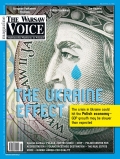

The Warsaw Voice | 22 październik 2008

* Pokazana okładka tytułu jest aktualną okładką tytułu The Warsaw Voice. Kiosk24.pl nie gwarantuje, że czytany artykuł pochodzi z numeru, którego okładka jest prezentowana.
Poland’s president and prime minister took their ongoing power struggle to an European Union summit in Brussels Oct. 15-16. President Lech Kaczyński had to charter a jet to attend the meeting after Prime Minister Donald Tusk refused to let him use a government plane.
Political squabbles over the composition of the Polish delegation started several weeks before the summit. Kaczyński announced he would go to Brussels and demanded to head the Polish delegation. Tusk responded that the summit would exclusively discuss issues dealt with by governments and so the delegation should be made up of the prime minister, foreign minister and defense minister.
A last-minute meeting between the two politicians Oct. 13 failed to resolve the conflict. After less than 30 minutes, Tusk, visibly annoyed, left the presidential palace refusing to comment to the media. Kaczyński’s aides said the president was determined to make a trip to Brussels. A day later, Tomasz Arabski, head of the Prime Minister’s Office, notified his counterpart at the President’s Office, Piotr Kownacki, that the president would not be able to use a government plane to travel to Brussels because one of the planes was set aside for the prime minister, while the other could not be used because the pilot had fallen ill. The President’s Office’s Michał Kamiński called that decision an unprecedented scandal. Kaczyński arrived in Brussels aboard his chartered plane Oct. 15. He showed up at the summit and took one of the seats assigned to the Polish delegation next to Tusk. Meanwhile, Radosław Sikorski, the foreign minister, and Jacek Rostowski, the finance minister, left the meeting hall, telling the media they had no intention of wrestling with Kaczyński. Presidential aides Mariusz Handzlik, Kownacki and Kamiński did not receive passes to enter the summit building, and Kaczyński had to go outside to talk to them.
Back home, Kaczyński said the summit was a success for Poland and that he and Tusk represented Poland’s strategic interests in Brussels. Kaczyński added he would take part in future EU summits as well.
The EU heads of state and government leaders meeting in Brussels agreed that the bloc’s next summit in December should unanimously back a deal on carbon dioxide emissions limits. Kaczyński said the very fact that a final decision on the issue had been postponed was good for Poland. Tusk said it was a good thing that the decision needs to be made unanimously because this will make it possible for coal-dependent Poland to veto the package should it turn out to be unacceptable.
The government estimates that in its current shape, the package would mean huge increases in electricity prices in the country. According to Tusk, French President Nicolas Sarkozy is ready to come to Poland Dec. 6 to try to persuade Kaczyński, a known Euroskeptic, tosign the Lisbon Treaty ratification document.
“We support the earliest possible ratification of the treaty by all EU countries,” Tusk said. Rostowski said Poland was “fully satisfied” with the summit’s decisionsrelated to the latest financial crisis in the world. The European Council approved a package of 14 measures to tackle the crisis. Meanwhile, the Brussels summit failed to put an end to the tug of war between the prime minister and the president. Tusk said he would ask the Constitutional Court to rule on whether the president has the right to demand to join a Polish delegation to an EU summit without consulting the prime minister. Tusk said he would try to persuade everyone that the Constitutional Court is the right institution to issue a precise interpretation concerning the powers of the most important executive authorities in the country.
Witold Żygulski
 Wróć do czytelni
Wróć do czytelni